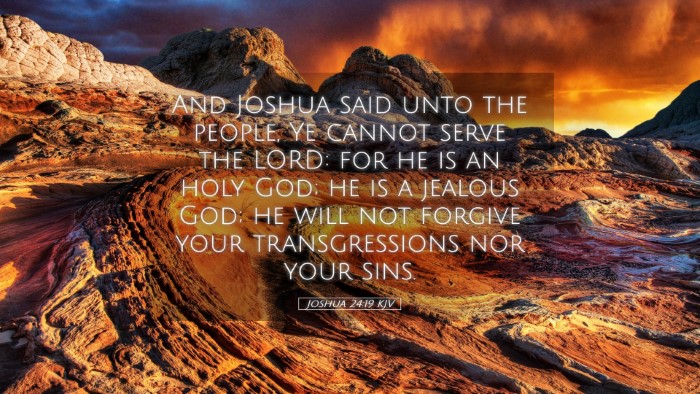Commentary on Joshua 24:19
Verse Reference: Joshua 24:19 - "But Joshua said to the people, 'You cannot serve the LORD, for He is a holy God. He is a jealous God; He will not forgive your transgressions nor your sins.'
Introduction
Joshua 24:19 serves as a crucial and sobering reminder of the nature of God and the seriousness of commitment to Him. It highlights the gravity with which God regards His covenant and the expectations He has of His people. As we explore insights from various public domain commentaries, we will delve into the theological significance of this verse, its implications for devotion, and the historical context surrounding Joshua's words.
The Nature of God
Holiness: In this verse, Joshua emphasizes that the Lord is a 'holy God.' The holiness of God signifies His absolute purity, separation from sin, and moral perfection. Matthew Henry notes that God's holiness is central to His character and that it demands a response of reverent obedience from His followers.
Jealousy: Further, the text describes God as a 'jealous God.' Albert Barnes elucidates that this jealousy is akin to a protective fervor for His own glory and the well-being of His people. God's jealousy is not petty but rather reflects His unwavering commitment to His people and intolerance of any rival loyalties.
The Call for Commitment
Joshua's declaration underscores the seriousness of serving God. Adam Clarke points out that Joshua's assertion is not merely a warning but an invitation to self-examination regarding the nature of their commitment. Are they truly ready to live out the covenant in the presence of such a holy and jealous God?
The People's Response
Previous verses in the chapter demonstrate the people's eagerness to serve the Lord, yet Joshua cautions them about the depth of that commitment. They must understand that serving the Lord entails more than mere words; it involves genuine actions and faithfulness. This aspect of the commitment process resonates deeply with pastors and theologians who guide congregations in understanding true discipleship.
Transgressions and Sins
The phrase 'He will not forgive your transgressions nor your sins' is particularly weighty. This does not suggest that God is unwilling to forgive altogether, but it emphasizes the seriousness of the people's intentions and actions. As emphasized by Barnes, the implication is that continued disobedience and hypocrisy in one’s heart can lead to a place where forgiveness may not be readily available.
Theological Implications
- Understanding Grace: One critical aspect for theologians to consider is how this verse correlates with the New Testament understanding of grace. While Joshua's statement carries a severe warning, the grace revealed through Christ brings a fuller understanding of repentance.
- Holistic Devotion: The concept of holistic devotion is evidenced in Joshua's challenge. Pastors are encouraged to help congregants understand that true service to God affects every part of life, not just spiritual or religious activities.
- Consequences of Idolatry: Joshua's warning serves as a reminder of the consequences of idolatry. Theologians may explore how worshiping other gods leads to spiritual decay and what that means for modern believers today.
Conclusion
Joshua 24:19 stands as a pivotal reminder of God's holiness and the sincerity required in serving Him. The verse calls all believers to consider the depth of their commitment and the implications of their choices. As they navigate their faith, they are urged to engage in profound reflection about their relationship with God and the seriousness of His call.
In summary, the insights of public domain commentators like Matthew Henry, Albert Barnes, and Adam Clarke provide valuable perspectives on this profound verse. It challenges believers to a higher standard of devotion and serves as a call to integrity in their spiritual walk.


